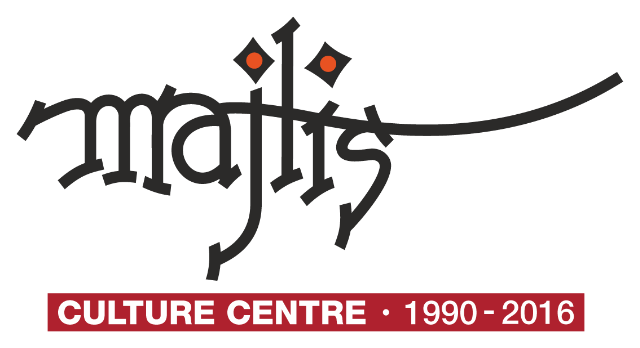Majlis Culture Centre (1990-2016) was a platform for inter-disciplinary, multi-formats art initiatives in Bombay / Mumbai. It produced contemporary art projects, conducted pedagogical activities, curated political and public art, provided fellowships and other supports to individual artists, developed innovative forms and formats for collaborative art practices, collated public history archives, and led resistant actions. The journey of the centre could be marked by the political and cultural landmarks of its time – Babri Masjid demolition, the rise of fundamentalism and ultra-nationalism; critical feminist thinking; trends in cultural studies; over-urbanisation, gentrification and globalisation; rise and decline of popular culture industries; emerging memory practices and archival initiatives, and so on.
The choice of the name was prompted by the desire to popularise a word that represents a broad Asian concept for collective / gathering and to restore it in its secular glory -– Mejlis means council in Arabic; Majlis is site of public culture in Bengali; baithak in Punjabi; a parlour / salon in elite Arab households; parliament in Iran; elected and administrative units in UAE, Malaysia, Maldives and so on.
The inception of the centre was marked by EXPRESSION (1990), the first feminist art festival in India. And its concluding project was Cinema City: Research Art and Documentary Practices (2009-2014) – a large scale endeavour with 100 artists, architects, filmmakers and cultural scientists to explore the points of consolidation and disintegration of urban public culture around the phenomenon of cinema in the 20th century Bombay / Mumbai.
It was legally attached to Majlis Manch trust. And it was an essentially Bombay entity.
To Join and to Leave, a Majlis by Abhijan Toto
The people who had been involved in conceptualising the centre since its inception were Neera Adarkar, Flavia Agnes, Madhusree Dutta, Anuradha Kapur, Mitra Mukherjee Parikh , Meenal Patel, and Nilima Sheikh. Madhusree Dutta was the director of the centre. Through the 25 years of its journey, more people joined in as associates and collaborators. Some of them were Jasodhara Bagchi, Vidya Bal, Kaushik Bhaumik, Suresh B V, Samma Blu, Gita Chadha, Indu Chandrashekhar, Ratnabali Chatterjee, Lavina Fernandes, Shanta Gokhale, Veena Gowda, Abeer Gupta, Shilpa Gupta, Archana Hande, Richa Hushing, Nupur Jain, Tushar Joag, Shyamal Karmakar, Jayashree Kewalramani, Avijit Mukul Kishore, Merle Kröger, Shals Mahajan, Nalini Malani, Jabeen Merchant, Saeed Mirza, Kausik Mukhopadhayay, Mamta Murthy, Ajay Naronha, Smriti Nevatia, Vibha Nijhawan, Sudhir Patwardhan, Paroma Sadhana, Renu Savant, Philip Scheffner, Manjula Sen, Chayanika Shah, Afrah Shafiq, Surabhi Sharma, Gulammohammed Sheikh, Rohan Shivkumar, Amrita Shodhan, Hansa Thapliyal, Atul Tiwari, Paromita Vohra, Nicole Wolf and many others. There were also Sarita More, Narayan Nimbalkar, Daisy Rodriguez and Sunil Tandel who made the centre a hospitable space. The wonderful logo of Majlis was designed by Touch Creative Media. (Apologies for inadvertently missing names, if any. It has been a long time. This site is structured in retrospect in 2022.)
The activities of Majlis Culture Centre were sustained mainly by support from HIVOS and Ford Foundation. We wish to specially acknowledge Jamuna Ramakrishnan, Rajendra Nathan and Ravina Aggarwal for their belief in the concept of a cultural Majlis. There have also been periodic supports from Goethe Institute / Maxmueller Bhavan, Global Fund for Women and few other agencies.
